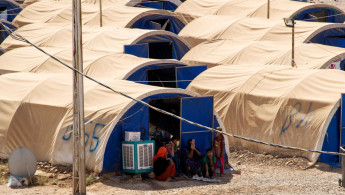Nearly 700,000 Iraqis from war-torn Mosul still displaced: NGO
Nearly 700,000 Iraqis from the former Islamic State stronghold of Mosul and nearby areas are still displaced despite the city's recapture in July, the Norwegian Refugee Council said on Sunday.
"One year since the start of the battle to retake Mosul from the Islamic State group (IS), some 673,000 Iraqis from the city and its surroundings remain displaced and unable to go back to their destroyed neighbourhoods," it said.
"More than half of them may have lost their official civil documents - from birth certificates to property deeds - which will make rebuilding their lives even harder," added the humanitarian group, which operates in Iraq.
Mosul was seized by the militants in 2014 during an offensive that saw them take control of large parts of Iraq and neighbouring Syria.
The nine-month offensive to recapture Iraq's second city left many neighbourhoods in ruins.
"The battle of Mosul is over, but for hundreds of thousands who fled the city, their suffering and despair continues," said the NRC's Iraq country director Heidi Diedrich.
"People we work with are still missing some of the most basic necessities and have no idea if they will ever be able to go back to their homes."
She called on the international community "to stand in solidarity" with the displaced Iraqis and for the government to ensure their rights "are at the forefront" of reconstruction efforts.
'The final fight'
The comments came after a general in the US-led coalition against the extremists said the "final large fight" against the Islamic State in Iraq will take place on the border with Syria.
IS seized vast areas of Iraq and Syria in 2014, but multiple offensives in both countries have since cornered it in a pocket of territory stretching from Syria's Deir az-Zour to the Iraqi towns of Rawa and al-Qaim.
Successive defeats this year in Tal Afar, and most recently in Hawija, have dealt a huge blow to the Islamic State group, which lost its Iraqi 'capital' of Mosul in July.
"The next fight and the final large fight will be in the Middle Euphrates River Valley... on the Iraqi-Syrian border," Brigadier General Robert Sofge, the coalition's Deputy Commanding General, told AFP.
"All campaigns will aim in that direction, and it is going to happen sooner rather than later."
Meanwhile Iraqi security forces have been able to regroup and move quickly into new battles following their Mosul victory, Brigadier General Andrew A. Croft, the coalition's deputy air force commander, said.
"We, as the Coalition, are moving quickly to match," he said.
Sofge said IS was shifting from a military mindset to that of an insurgent group with "sleeper cells" able to launch surprise attacks.
"The challenge for the years ahead is police work in Iraq and Syria," he said.
"IS fighters who are not killed or captured are trying to fade back into the fabric of the society."
While IS militants have tried to hide among the thousands of people displaced by fighting, Croft said some 1,000 IS fighters were captured in Hawija.





 Follow the Middle East's top stories in English at The New Arab on Google News
Follow the Middle East's top stories in English at The New Arab on Google News
![Israeli forces ordered bombed Gaza's Jabalia, ordering residents to leave [Getty]](/sites/default/files/styles/image_330x185/public/2176418030.jpeg?h=a5f2f23a&itok=_YGZaP1z)

